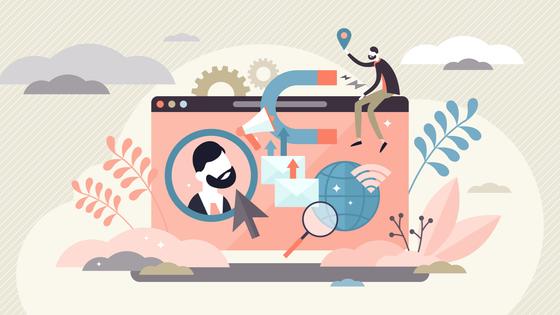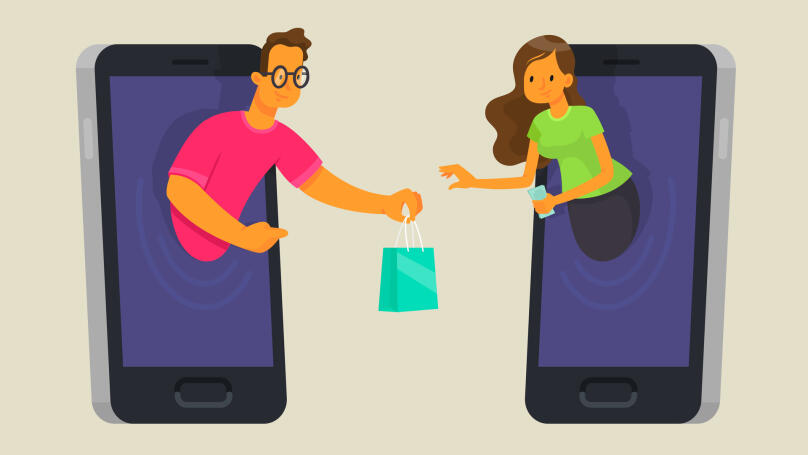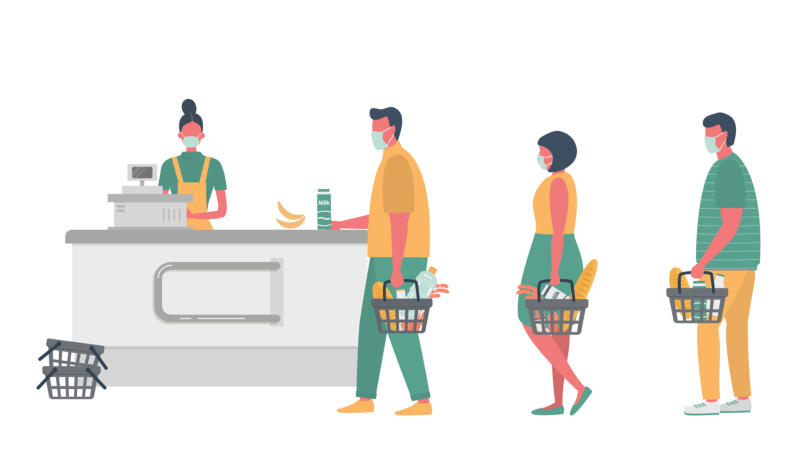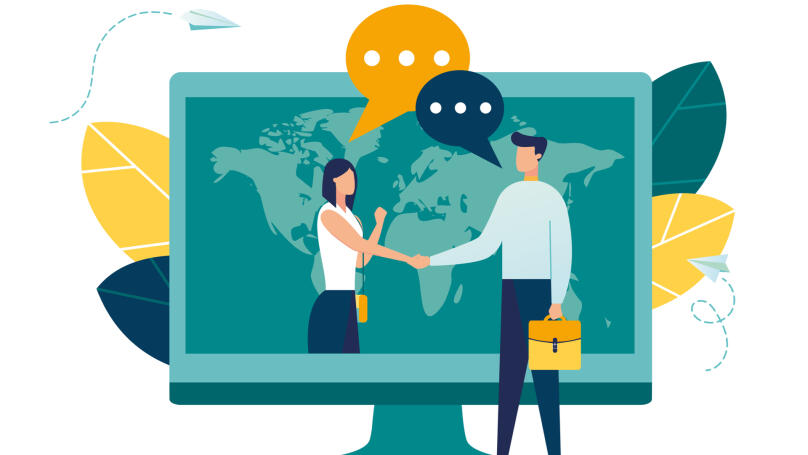Seven life-hacks from sales psychology that will help you find your way to the buyer
Emotions control people far more than we like to think. And that is true for customers too - they often buy impulsively, driven by certain feelings and stimuli. A salesperson should take this into account in their work.

Calculating an individual's actions is challenging, but people are guided by the same considerations in certain situations and tend to make similar decisions. Sales psychology allows you to identify such patterns and use them to your advantage to increase revenues. This article is based on the course "Gaining Customer Trust. Online and Offline Sales" so click the link to learn more.
Lifehack 1. Grab attention, then make rational arguments

Often people buy products based on emotion, but they don't like to admit it. The salesperson's job is first to elicit an emotional response from the buyer and then help them find a rational justification for their purchase.
An Example. A potential buyer sees a striking billboard with a man enjoying a fast car ride in front of the car dealership entrance. The customer feels the desire to buy the car, and the salesperson finds justification for the purchase: the car is fuel-efficient, it is comfortable for family trips, and it is safe. The customer will buy because the car makes them feel good, but they will find many logical reasons for doing so. The salesperson's job is to help them do that.
Lifecycle 2. Offer a benefit

People like to think they buy rationally, even if, in reality, they don't. A practical benefit is a rational justification for the purchase. The seller's task is to make the benefits so apparent to the customer so that they will inevitably make a purchase.
The benefits are individual for every customer, so it's essential to research your audience well before offering them the benefit. A discounted price is considered a universal benefit, but the "stock sale" or "sale price" technique is used so often that customers become immune to it. Often customers get into the habit of moving from shop to shop in search of discounts.
Lectera’s Online Courses by topic
Lifehack 3. Turn on the charm

Undoubtedly, it is easier to spend time with people who we like, so for a salesperson to please a customer almost always means closing a deal, and charisma, like the ability to charm other people, can be levelled-up.
However, if you aren't quite yet ready to work on your charisma, use three simple techniques:
- Smile. A person subconsciously fears aggression from another person. A smile sends a non-verbal signal that there is no reason to be afraid.
- Tilt your head to the side. By tilting your head sideways, the animal reveals its most vulnerable place, the neck. In the animal world, a demonstration of absolute trust. Humans unconsciously read this signal the same way.
- Copy the gestures of your conversation partner. People love their own quirks and gestures, so they find it attractive in those people who echo them. However, one caveat, do it naturally because otherwise your conversation partner might be offended finding they were mocked.
Lifecycle 4. Speak the customer's language

People don't like to count and calculate. That helps companies create the illusion of profit. For example, if the first company sells 930 ml of milk in a carton, and the competitors sell 1 litre, the price for the 930 ml carton will be lower. Nevertheless, the customer will end up paying more for a litre of the first company's product. The reluctance of customers to put in the effort and calculate may be beneficial to the company, or, on the contrary, it may be detrimental to its profits.
The mass buyer does not analyse the benefits of a product unless it is presented in an understandable form. For instance, battery capacity may be an incomprehensible term for some customers. So, it is better to give them an interpretation as in the following sentence.
An Example: You can watch videos for 10 hours on your smartphone, not needing to charge your device.
Lectera’s Online Courses by topic
Lifecycle 5. Build trust

By nature, people are inherently suspicious. Especially, as we've said, they have a profound distrust of salespeople.
Evidently, one of the main obstacles to buying is the fear of being deceived. People may refuse to buy because they want to avoid losing money and the unpleasant feeling that they have been mugged off and made a fool of themselves.
Therefore, an essential step in successful selling is to make the customer feel safe. So in no circumstances should you ever unduly pressurise them or lie. Correct pressure is only appropriate when the seller is closing the deal and needs to encourage the client to buy. Also to gain the buyer's trust is easier using next arguments: feedback and comments from satisfied customers, the thoughts of opinion leaders and experts, and scientific research data.
Lifehack 6. Allow customers to "be like everyone else."

Advertising relies on individuality, but it's often more important for sales to allow customers to "keep up with the Joneses." Consequently, it's an excellent idea for a salesperson to offer a product that other people like: increasing the chances of a sale. Ideally, the product should have the advantage of being like everyone else, but a little better.
Often, the desire to feel comfortable and safe is the customer's strongest desire. That is why salespeople try to establish a rapport with the customer and find a way to approach them. Products that other customers buy will also help to create that "feel good factor."
Lifehack 7. Make it easy to shop

The contemporary shopper gets inundated with offers. Choosing which shop offers the best value for money takes time and effort that are always in short supply. The buyer is looking for a way to conserve these resources, so they often choose brands that have already been used, and when deciding, they first consider the convenience of the purchase. In most cases, the retailer cannot influence these factors: organise a brand PR campaign, open a shop in the right area, or set up an online sales system. The retailer's responsibility is to try to make the customer's interaction with the shop as convenient as possible.
A customer often comes to a shop to make a purchase and receive emotions: retail therapy! The joy of buying a new thing, the confidence of having made a bargain. The list could go on and on.
Definitely, it is useful for the salesperson to train themselves to identify what needs the customer wants to close and do everything they can to ensure that they get these emotions. If the customer receives the feeling they want, the chances are that they will end up buying the product.
Share this with your friends via:
Latest News

A significant stage in the development of the alternative education system has begun in West Northamptonshire in the UK: the County Council is actively calling on parents, guardians, and trustees to participate in shaping the future of this key area.

Outwoods Primary School in Atherstone, Warwickshire, having experienced deep sadness after the loss of their famous cat, Silla, has found solace in a new pet – a Maine Coon named Aloysius O’Hara.

In modern universities, artificial intelligence, and in particular ChatGPT, is rapidly transforming from a controversial tool into a full-fledged student assistant.

An innovative educational project is gaining momentum in UK primary schools, aiming to change attitudes towards video games.

The Massachusetts Institute of Technology (MIT) presents MIT Learn – a revolutionary online platform that opens a “new front door” to access university knowledge and resources.












 Test. Check Your Social Media Dependency Level!
Test. Check Your Social Media Dependency Level!
 Test: What Business is Right For You?
Test: What Business is Right For You?
 “I’m Here for the Long Haul”: When Loyalty to a Company Becomes Toxic
“I’m Here for the Long Haul”: When Loyalty to a Company Becomes Toxic
 Test: How Prone Are You to Abusive Behavior as a Manager?
Test: How Prone Are You to Abusive Behavior as a Manager?
 Test. What superpower would you possess if you were a superhero?
Test. What superpower would you possess if you were a superhero?
 Test. What Should You Let Go of Before Winter Ends?
Test. What Should You Let Go of Before Winter Ends?
